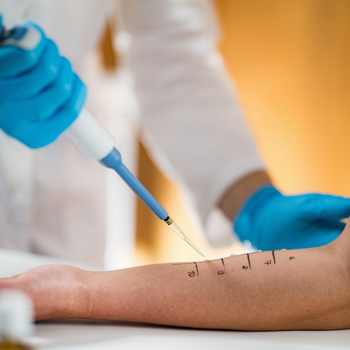Allergy Testing Q & A
What causes allergies?

When you have allergies, your immune system goes into overdrive when you’re exposed to a harmless substance. Every time you encounter the allergen, your immune system releases chemicals such as histamines, which help your body fight off the invader.
Histamines work by targeting the areas where the allergen enters your body. They can cause widespread inflammation and excess mucus as they try to fight off the allergen. While it isn’t always known why some men, women, or children have allergies, medical experts do find that these factors can increase your risk:
- A family history of allergies
- Warm climate or environment
- Chronic bronchitis or asthma
You’re also more likely to develop allergies as a child, although in some cases, it’s possible to outgrow allergies as you get older.
How do I know if I have allergies?
You’ll experience a variety of symptoms, depending on the type of allergy. Hay fever, for example, primarily affects your nose and eyes, while a contact allergy causes a skin reaction.
. Some of the most common signs and symptoms of allergies include:
- Runny or itchy nose
- Sneezing
- Watery, red, and/or itchy eyes
- Hives and rashes (for a skin allergy)
- Upset stomach, cramps, nausea, or diarrhea (for a food allergy)
A severe allergic reaction, which most often occurs in food, insect, and latex allergies, could lead to anaphylactic shock. This potentially life-threatening situation causes difficulty breathing, a drop in blood pressure (dizziness), and loss of consciousness.
What happens during allergy testing?
Once your dedicated allergist at Allergy Testing Center discusses your symptoms with you and gets a better understanding of which allergies might be triggering your symptoms, they can order allergy testing. Depending on your symptoms, your practitioner may order a blood allergy test or a skin test to check for the following allergies:
- Allergies to foods, such as peanuts, eggs, soy, or shellfish
- Allergies to environmental substances, such as grass, trees, dust mites, mold, animals, or ragweed
- Allergies to stings from bees, fire ants, and other stinging insects
Blood allergy tests require a blood sample, and your results will come back within a few days. With allergy skin tests, your allergist will place tiny amounts of allergens on your skin and watch for reactions. Results are immediate, and you can find out the same day which allergens are triggering your symptoms.
Book your allergy testing appointment at Allergy Testing Center online or by calling your closest location.
